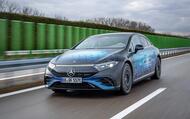When Mario Illien and the late Paul Morgan founded Ilmor Engineering in 1983, neither could have dreamed what part of their company would be doing 40 years later.
Based at Brixworth, the firm was formed to develop methanol-fuel Indycar engines but soon branched into Formula 1 and eventually sold its F1 division to Mercedes-Benz.
Today, as Mercedes AMG High Performance Powertrains (HPP), it’s playing a major part in developing what could be the most advanced EV battery yet.
Solid-state batteries have been on the radar for years now, but we’re still waiting. So news that Mercedes began road testing a new battery earlier this month in an EQS using cells from US-based Factorial Energy is significant – not least because it tackles a key drawback associated with these high-capacity lithium batteries by using a new patented technology.
The earliest prototype lithium battery developed by British chemist M Stanley Whittingham had metal anodes made from a blend of lithium and aluminium rather than the graphite used today. The design proved unstable and manufacturing too complex for production, but the thinking was spot on.
Lithium metal has the highest energy capacity of any anode material and has the potential for batteries with correspondingly higher energy density, delivering longer range than existing production EV batteries. But there are two problems.
The first is that lithium metal anodes produce tentacle-like dendrites, which eventually travel through the liquid electrolyte of a conventional lithium ion battery, touching the cathode and destroying the battery. Solid-state batteries prevent this by using a solid electrolyte.
The second problem is that the volume of cells containing lithium anodes increases and decreases during charging and discharging, which causes a mechanical problem in a tightly packed battery.
HPP has come up with a hydraulically actuated ‘floating’ cell carrier so the cells can swell and contract without damage. It represents a major step in being the first time a battery with lithium metal anodes has been successfully used in a production car.
Will it be the most advanced EV battery? The numbers suggest so. The EQS is targeted to achieve 620 miles, around 25% more range, using a battery of the same weight and dimensions as the standard EQS battery.
Its cells are based on the maker’s Factorial Electrolyte System Technology (Fest), which it describes as “quasi-solid electrolyte technologyâ€.
Its sulphide-based tech, called Solstice, has an all-solid-state electrolyte material that in future trials will raise the range game still further.
Fest also has a lithium metal anode giving similar performance and safety advantages to all-solid-state electrolytes mixed with the production ease of conventional lithium ion batteries.
Factorial also has deals in place with Stellantis and Hyundai, which bodes well for more affordable cars too.

